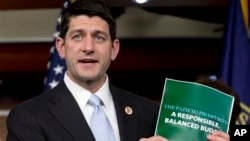CAPITOL HILL —
Fifty years after U.S. President Lyndon B. Johnson declared war on poverty, about 46 million Americans are living in poverty. Republican House Budget Committee Chairman Paul Ryan says government social welfare programs are not working, and it is time to listen to those fighting poverty on the front lines for different approaches. Democrats say things would be much worse, however, without government services for the poor.
Democratic and Republican lawmakers faced off Wednesday at a hearing on the role of the government in helping to lift people out of poverty. Republican House Budget Committee Chairman Paul Ryan said the government has failed.
“I think we can all agree that Washington isn’t making anybody proud these days," said Ryan. "Right now, the federal government spends nearly $800 billion a year on 92 different programs to fight poverty. Yet the official poverty rate is the highest in a generation. And over the past three years, deep poverty has been the highest on record. Clearly, we can do better.”
Related video report by Cindy Saine:
Most Democratic lawmakers strongly disagree, and oppose Ryan’s budget that would raise defense spending but sharply cut spending on domestic programs for the poor. It passed the House but not the Senate.
The president of the non-profit group, the Center for Neighborhood Enterprise, Robert Woodson, said the focus on government programs has created a whole industry of those who service the nation’s poor.
“Seventy percent of all the dollars over the years that we have spent on the poor goes to those who serve poor people,” said Woodson.
Woodson argued the focus should be on private enterprise giving people jobs. Ryan has come under criticism for remarks suggesting that some poor people in inner cities lack a culture of hard work. Democratic Representative Chris van Hollen accused Republicans of misunderstanding the roots of poverty.
“But it adds insult to injury to claim, as Republicans do, that shredding the social safety net actually helps those who are struggling every day to make ends meet," said van Hollen. "This claim is based on a false and pernicious stereotype that many of these struggling individuals prefer to rely on these safety nets - sometimes mockingly referred to as hammocks - rather than get a job. This mindset is a fantasy world approach - that by dismantling anti-poverty programs, we will reduce poverty.”
Ryan met Wednesday with members of the Congressional Black Caucus to discuss ways to reduce poverty. After the meeting, Democratic Congressional Black Caucus chair Marcia Fudge spoke to reporters.
“We appreciate Chairman Ryan coming to our meeting. [We] did not get a whole lot accomplished, but we do agree on a number of things. One is that we are both concerned about the poverty in this country. We just disagree on how we address the problem,” she said.
Fudge said Ryan agreed to invite members of the Congressional Black Caucus to present their views at a future hearing on alleviating poverty.
Democratic and Republican lawmakers faced off Wednesday at a hearing on the role of the government in helping to lift people out of poverty. Republican House Budget Committee Chairman Paul Ryan said the government has failed.
“I think we can all agree that Washington isn’t making anybody proud these days," said Ryan. "Right now, the federal government spends nearly $800 billion a year on 92 different programs to fight poverty. Yet the official poverty rate is the highest in a generation. And over the past three years, deep poverty has been the highest on record. Clearly, we can do better.”
Related video report by Cindy Saine:
Most Democratic lawmakers strongly disagree, and oppose Ryan’s budget that would raise defense spending but sharply cut spending on domestic programs for the poor. It passed the House but not the Senate.
The president of the non-profit group, the Center for Neighborhood Enterprise, Robert Woodson, said the focus on government programs has created a whole industry of those who service the nation’s poor.
“Seventy percent of all the dollars over the years that we have spent on the poor goes to those who serve poor people,” said Woodson.
Woodson argued the focus should be on private enterprise giving people jobs. Ryan has come under criticism for remarks suggesting that some poor people in inner cities lack a culture of hard work. Democratic Representative Chris van Hollen accused Republicans of misunderstanding the roots of poverty.
“But it adds insult to injury to claim, as Republicans do, that shredding the social safety net actually helps those who are struggling every day to make ends meet," said van Hollen. "This claim is based on a false and pernicious stereotype that many of these struggling individuals prefer to rely on these safety nets - sometimes mockingly referred to as hammocks - rather than get a job. This mindset is a fantasy world approach - that by dismantling anti-poverty programs, we will reduce poverty.”
Ryan met Wednesday with members of the Congressional Black Caucus to discuss ways to reduce poverty. After the meeting, Democratic Congressional Black Caucus chair Marcia Fudge spoke to reporters.
“We appreciate Chairman Ryan coming to our meeting. [We] did not get a whole lot accomplished, but we do agree on a number of things. One is that we are both concerned about the poverty in this country. We just disagree on how we address the problem,” she said.
Fudge said Ryan agreed to invite members of the Congressional Black Caucus to present their views at a future hearing on alleviating poverty.






